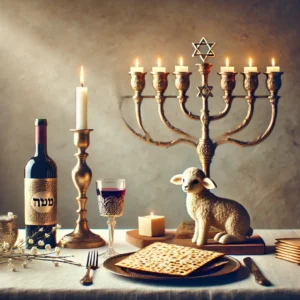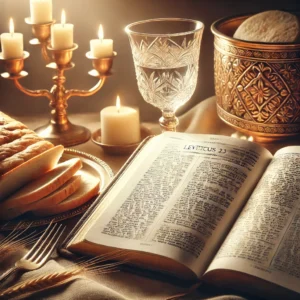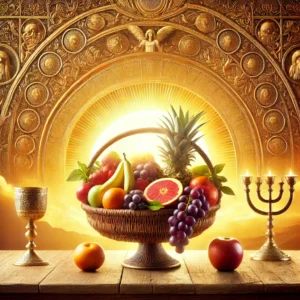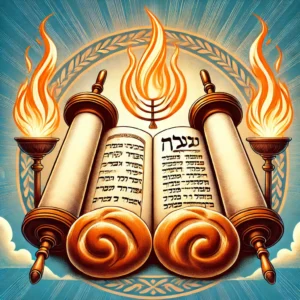Feast Days in the Bible | Messianic Holy Days
Feast Days in the Bible
The **Moedim** (Appointed Times) in the Torah are sacred days set by God as holy convocations. These feasts hold deep significance in Scripture and find fulfillment in Yeshua.
Feast Days for 2025
| Feast | Date (2025) | Torah Reference |
|---|---|---|
| Passover (Pesach) | April 12 | Leviticus 23:5 |
| Unleavened Bread | April 13-19 | Leviticus 23:6-8 |
| First Fruits | April 14 | Leviticus 23:9-14 |
| Shavuot (Pentecost) | June 1 | Leviticus 23:15-22 |
| Yom Teruah (Trumpets) | September 27 | Leviticus 23:23-25 |
| Yom Kippur (Atonement) | October 6 | Leviticus 23:26-32 |
| Sukkot (Tabernacles) | October 11-18 | Leviticus 23:33-44 |
Passover (Pesach)

Feast of Unleavened Bread

First Fruits
The Feast of First Fruits is a biblical celebration marking the offering of the first harvest to God as an act of gratitude and trust in His provision (Leviticus 23:9-14). This feast was observed by bringing the first sheaf of barley to the priest, who would wave it before the Lord, acknowledging that the entire harvest belonged to Him. It symbolizes faith, new beginnings, and dependence on God’s blessings.
In Messianic belief, First Fruits finds its ultimate fulfillment in Yeshua, who was resurrected on this very day, becoming the firstfruits of those who have died (1 Corinthians 15:20-23). Just as the first sheaf was offered as a guarantee of a greater harvest to come, Yeshua’s resurrection is the promise of eternal life for all who follow Him. Today, believers recognize this feast as a prophetic foreshadowing of resurrection and renewal, celebrating the victory of Yeshua over death and the hope of future resurrection for those in Him.
Shavuot (Pentecost)
The Feast of Shavuot (Pentecost) is one of the biblical appointed times (Leviticus 23:15-22) that commemorates the giving of the Torah at Mount Sinai, when God established His covenant with Israel. Fifty days after the Exodus, the Israelites gathered at the foot of Mount Sinai, where they received the Ten Commandments, marking the moment when they became a nation set apart for God. This feast is also known as the Feast of Weeks, as it is counted seven weeks from the Feast of First Fruits.
In Messianic fulfillment, Shavuot is the day when the Holy Spirit (Ruach HaKodesh) was poured out upon Yeshua’s disciples in Acts 2, ushering in the new covenant prophesied in Jeremiah 31:31-33. Just as God wrote His law on stone tablets at Sinai, He now writes His Torah on the hearts of believers through the Holy Spirit. Today, Shavuot is a time of spiritual renewal, thanksgiving, and seeking God’s wisdom, recognizing both the Torah given to Israel and the Spirit given to all believers in Yeshua, empowering them to live in righteousness.
Yom Teruah (Feast of Trumpets)
The Feast of Trumpets (Yom Teruah) is a biblical holy day that marks the beginning of the seventh month on the Hebrew calendar (Leviticus 23:23-25). It is a day of blasting the shofar (ram’s horn), calling God’s people to wake up, repent, and prepare for divine judgment. In ancient Israel, trumpets were used to signal war, coronate kings, and call assemblies, making this feast deeply connected to themes of repentance, kingship, and prophetic fulfillment.
In Messianic understanding, Yom Teruah foreshadows the return of Yeshua, when the last trumpet will sound and the faithful will be gathered to Him (1 Thessalonians 4:16-17, 1 Corinthians 15:51-52). Many believe this feast prophetically points to the second coming of Messiah, when He will return as King to establish His reign on earth. Today, believers observe this feast by blowing the shofar, engaging in prayer and repentance, and eagerly anticipating the fulfillment of God’s promises, knowing that one day, the final trumpet will announce the arrival of our King, Yeshua.
Yom Kippur (Day of Atonement)
The Day of Atonement (Yom Kippur) is the holiest day of the biblical calendar, set apart as a day of fasting, repentance, and seeking atonement before God (Leviticus 23:26-32). On this day in ancient Israel, the High Priest would enter the Holy of Holies to make atonement for the sins of the people, sprinkling the blood of a sacrificial offering on the Ark of the Covenant. This was the only day of the year the High Priest could enter the Most Holy Place, emphasizing the gravity of atonement and reconciliation with God.
In Messianic fulfillment, Yeshua serves as our eternal High Priest (Hebrews 9:11-12), making final atonement for sin through His own blood, once and for all. Just as the High Priest interceded for Israel, Yeshua intercedes for us before the Father, offering complete redemption. Many believe Yom Kippur foreshadows the final judgment, when God will separate the righteous from the wicked.
Today, believers observe Yom Kippur as a time of deep reflection, repentance, and seeking God’s mercy, recognizing that through Yeshua’s sacrifice, atonement is complete, and we are invited into a restored relationship with our Creator.
Sukkot (Feast of Tabernacles)
The Feast of Tabernacles (Sukkot) is a joyful biblical celebration that commemorates God dwelling with His people and His provision during the Israelites’ 40 years in the wilderness (Leviticus 23:33-44). For seven days, families build and dwell in sukkot (temporary shelters), reminding them of God’s presence and protection. This feast is also known as the Festival of Ingathering, celebrating the final harvest and symbolizing God’s abundant blessings.
In Messianic fulfillment, Sukkot foreshadows the coming Kingdom of God, when Yeshua, our Emmanuel (God with us), will dwell among His people in the New Jerusalem (Revelation 21:3). Many believe this feast prophetically points to the Messianic Age, when Yeshua will establish His reign on earth, bringing peace and restoration.
Today, believers celebrate Sukkot with rejoicing, fellowship, and thanksgiving, recognizing that just as God tabernacled among His people in the wilderness, He has now tabernacled among us through Yeshua (John 1:14), and He will one day dwell with us forever in His eternal kingdom.





